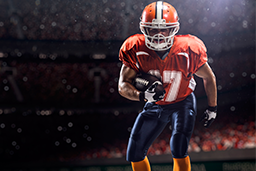The NCAA made big news recently, voting to suspend its rules related to one category of compensation earned by college athletes. The headlines in the wake of the NCAA’s move have touted the ability of these students to benefit (read: cash in) from the use of their names, images and likenesses (NIL).
More than 460,000 football, baseball, basketball, tennis, soccer, lacrosse and tennis players, swimmers, gymnasts, and every other collegiate level athlete can now be hired for brand ambassadorships, social media promotion, appearances, sponsorships, autograph signings and the like—some already have. And while this is great news for many, college athletics remains without a long-term solution to its NIL problem given the patchwork of related laws now in effect, not to mention the NCAA’s interim NIL policy.
A State-Specific Query
With the effective waiver of its NIL rules, the NCAA has essentially deferred to the myriad of state laws governing NIL rights that became effective July 1, 2021. This has only served to complicate matters. Without any uniform direction from the NCAA or, more ideally, the United States Congress, states are left to enact or otherwise adjust their own laws to make their college athletic programs just a little more lucrative in order to attract athletes. In turn, we may be in for a “race to the bottom” for some of the less scrupulous players in NCAA sports.
As of this writing, 24 states have laws or executive orders on the books governing NIL rights for college athletes. Predictably, this hodgepodge of regulation—which is bound to get even worse with virtually every other state considering its own NIL legislation—is sowing a modicum of chaos and confusion across the collegiate sports landscape. The NCAA, by way of its recent action, could have helped to clarify discrepancies, but it failed to do so.
In states that have passed NIL laws, the NCAA’s days-old waiver states that athletes can participate in NIL activities that are "consistent with the laws of the state where the school is located." Yet for states still without any NIL regulation, the NCAA suggests that students can freely engage in NIL activities, but schools and conferences in those states "may choose to adopt their own policies."
This, in short, is a recipe for disaster, as major conferences are poised to engage in an “arms” race to have the most liberal interpretations of compensation for NIL as an inducement for top athletes to attend their schools. At the same time, colleges and universities could adopt restrictive policies that chill NIL activities and, more concerningly, expose brands and athletes to liability if they are not fastidious in complying with an intricate web of rules and procedures. Likewise, disparities across state laws may have the unintended consequence of penalizing certain athletes, colleges and universities, and businesses situated in less NIL-friendly jurisdictions.
The Time Is Now for Those on Capitol Hill to Play Ball
Clearly, the U.S. Congress needs to impose a federal scheme to level the playing field and unify NIL standards for the benefit of college athletes, their institution, and interested third parties. Ideally, the NCAA would have liked legislators in D.C. to have enacted a law before July 1—when so many state laws went into effect—but that deadline has come and gone despite there being eight bills now pending before different committees in both the House and Senate, all mired in an unfortunate political divide. One way or another, our Congresspeople and Senators must break free from the gridlock and get to work finding a way to empower amateurs to monetize their NIL, all the while maintaining the integrity of the NCAA’s model that has provided millions of athletes the opportunity to receive a quality education.
There is more. The much-needed uniform federal law should be as liberal as possible and include the minimum number of economic restrictions feasible so that college athletes are treated just like non-athletes on campus who are able to trade on their NIL without limitation or interference by the NCAA.
Note to Student-Athletes and the Businesses Looking to Hire Them: Tread Lightly
Without question, the NCAA’s interim NIL policy is a major win for hard-working college athletes looking to take full advantage of their on-the field achievements and popularity. But given the legislative quagmire that has unfolded across the country, they must proceed cautiously and in compliance with school and conference requirements, as well as variations in state NIL laws, before signing sponsorship contracts or other money-making deals.
Caution is also key for the companies eager to sign college athletes to promote their products and services. As we enter a new chapter in American sports, businesses will have the opportunity to help shape a more equitable, more exciting and more profitable ecosystem at the collegiate level. Nevertheless, there may well be NCAA action in the not-so-distant future regarding overreach by athletes, boosters, agents and these companies in the absence of a clear, nationwide law providing order to the existing chaos.
Hayley Hodson, a rising third-year student at the UCLA School of Law and a summer associate in M&R’s NYC office, assisted in the writing of this post.
This blog post is not offered, and should not be relied on, as legal advice. You should consult an attorney for advice in specific situations.

